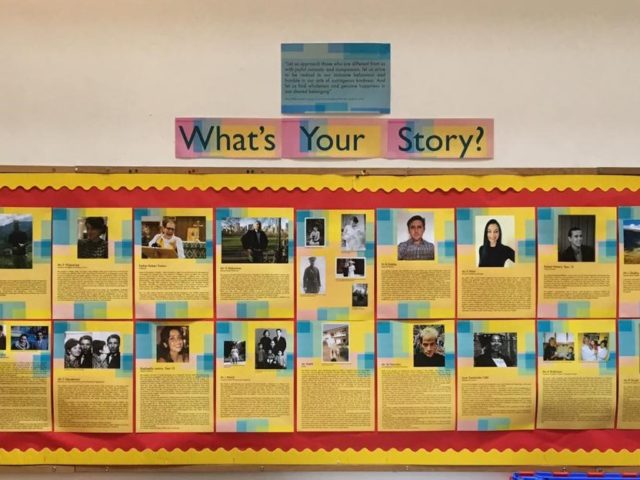“If I feel unhappy, I do mathematics to become happy. If I am happy, I do mathematics to keep happy.” Alfred Renyi
“The more I paint, the more I like everything.” Jean Michel Basquiat
These were striking quotations to find lodged at the core of last week’s assembly delivered by Polly Brownlee, Head of Mathematics here. Polly had been invited to talk about ‘maths – something even for the non-specialist’ (this week sees Rebecca Hyam, Polly’s counterpart in English, on something ‘even for the non-specialist’ in English). We might have expected the value of maths for the non-specialist to be argued in terms of its usefulness – say, our mathematical literacy in decision-making and in deep-reading the interpretations of our data-rich economy – but, while Polly gave us, almost reluctantly, compelling examples of applications of maths in justice and in police-work, both specialist and non-specialist can find, she argues, value in maths because of its inherent intrigue and beauty.
I’m not sure what I was expecting, but I wasn’t expecting that. After all, this is the season of Year 11 pupils making choices about subjects for the sixth form and I wouldn’t have held it against an adventurous Head of Department if they had made a pitch for the centrality of their subject in terms of utility. But Polly’s thesis, and that of her departmental colleagues, is that learning and study are quintessentially human activities; they are what make us human. And she’s not alone in asserting that what she loves about Highgate is that interest and curiosity are behind the questions they find themselves answering, even if the looming of public exams will sadly but only temporarily change the tone and pitch of the questioning.
Just as this is the season for thinking about the next year’s courses for Year 11s, so that timetables can be written and staffing can be adjusted to take account in the annual swings towards certain subjects and away from others, it’s also the time of peak attendance at open mornings: across London, pupils in Years 2 and 6 are getting ready for entrance tests, and their loved ones are asking questions, with varying degrees of candour about what they really want to know. My advice to parents and carers is to call a spade a spade, to cut to the quick, to say it as it really is: ‘How do you deal with pressure?’ is a great question if you want to probe a school’s pastoral systems and the way they link into mental health provision, and the porousness of that interface between what happens inside the classroom and inside the child. But it doesn’t tell you if there’s too much homework, or reassure you that your child will cope (and more) once they reach the school they’ve worked so hard to get into.
And I’ve been asked seemingly contradictory questions about pressure and rigour: on the one hand, whether the step up from primary and junior schools to Year 7 and 8 is too steep; and on the other, whether there’s enough demand and challenge in what we ask our pupils to do. Good questions, both of them, and reassuring and revealing in their being asked by very like-minded parents. One would think that children who sit and perform well in tests which probe quite a narrow range of sharply defined academic attributes might be broadly similar, but the magical thing is that, despite the necessary uniformity and consistency of 7+ and 11+ testing, what emerges in September is a wonderful kaleidoscope of omni-differing characters and attributes and enthusiasms. And that results in hugely differing responses to any number of things, not least to words like ‘rigour’, ‘stretch’ or ‘challenge’.
Let’s go back to that assembly. Our starting point has to be the child and the childlike qualities which make learning things aged 8 or 18 different from learning things aged 28 or 58: young people start out with curiosity and should end up with passion and ambition, and a school’s job is to create a culture and a community in which learning and study are seen as critical and as natural to growing up as good manners and good health, as being kind and keeping safe. For this to be credible to the young mind, there has to be mastery of things that are worth mastering: discovery is great and galvanic, but understanding has to follow on, and this forged in making the unfamiliar so familiar that it becomes part of intellectual and cultural hinterland. This is, however, happening in something akin to a greenhouse (not a hothouse!), where the temperature is carefully regulated to encourage strong and healthy growth: open the door to keep measuring that wonderfully unpredictable growth, and you will lose heat and moisture, and you risk stunting young plants, which will adapt to unfriendly conditions, of course, but in ways which will affect them in their mature, adult forms.
My guess is that we are, many of us, choosing a school which selects by ability for the reassurance that that will give us about the quality of educational thinking and provision, about the closeness of aspiration and value given to school by families of all kinds, about finding able, academically-minded teachers with bags of emotional intelligence on tap to inspire our children and to accompany and to guide them to wherever their multi-form, variegated intelligences may take them. We don’t want our schools to be run with the rigour of competitive civil service exams; we do want to know that our children will feed their minds on sustaining, thought-inducing, nutritious ideas and ‘stuff’.
So, dear parents and carers, you’ll need the school you choose and which chooses your child, to signal clearly and illuminatingly that your child does not need to live up to a paradigm of no one’s making, but of a competitive system’s making; progress will be like growth spurts – erratic, inconsistent and unpredictable; marks will tell you and us something but not everything, and we’ll have to walk the tightrope between being realistic and being tactically reassuring so that your child can grow without fear, yours or theirs, that they may not be living up to unspoken expectations. And all the time, we’ll be wanting them to feed their minds on this wonderfully enriched and enriching diet of knowledge taught for learning’s sake, so that every child, non-specialist and specialist, will find a sphere of learning to which they turn to make them happy and happier still.
And as a footnote, I found myself dawdling on my way home last night in Central Hall. There’s a spectacular display curated by Marco Palumbo of our Art Department: six massive picture frames spelling BEAUTY feature an inter-disciplinary project by Year 7s. They were asked to ponder what beauty is and what it means to them, and to look across the curriculum and outside the school to find it. Some found it in solving a conundrum in maths; others in reading a building; some in a writing a poem; others in creating a picture; one saw it in love. While I recall my children prosaically rejoicing at the advent of the project (having no set homework for a week or so), what I remember more was the unintended but deeply felt parental astonishment at seeing those young, multifarious minds take wing.
Adam Pettitt, 30 November 2017

